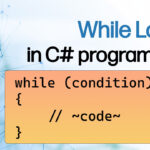Have you ever played a game and wondered how the computer knows when to make certain moves? Or have you ever used an app that only shows certain features when you’ve completed specific actions? These actions are possible because of a fundamental concept in programming known as conditional programming. In this tutorial, we’ll cover the basics of conditional programming using examples in C#, one of the most popular programming languages for beginners. By the end of this tutorial, you’ll understand how to make your programs make decisions based on certain conditions, just like a computer game or app!
Conditional programming is a fundamental concept in programming. It allows a program to make decisions based on certain conditions. These conditions could be as simple as whether a number is greater than another number, or as complex as whether a user is logged in and has the necessary permissions to perform an action. In this tutorial, we’ll cover the basics of conditional programming using examples in C#, one of the most popular programming languages for beginners.
Conditionals
Before we dive into conditional programming, let’s first understand what a condition is. A condition is a statement that evaluates to either true or false. For example, “2 + 2 = 4” is a condition that evaluates to true, while “5 < 3” is a condition that evaluates to false.
Now let’s look at the basic syntax for conditional programming in C# using the “if” statement:
if (condition)
{
// code to execute if the condition is true
}
Here, “condition” is the condition that we want to check. If the condition is true, then the code inside the if statement will be executed. If the condition is false, then the code inside the if statement will be skipped.
Let’s see an example:
int x = 5;
if (x > 3)
{
Console.WriteLine("x is greater than 3");
}
In this example, we’re checking whether the value of “x” is greater than 3. Since “x” is 5, which is greater than 3, the code inside the if statement will be executed and the output will be “x is greater than 3”.
We can also add an “else” statement to the if statement to provide an alternative code block to execute if the condition is false:
int x = 2;
if (x > 3)
{
Console.WriteLine("x is greater than 3");
}
else
{
Console.WriteLine("x is less than or equal to 3");
}
In this example, since the value of “x” is less than 3, the condition in the if statement will be false and the code inside the else statement will be executed instead, resulting in the output “x is less than or equal to 3”.
We can also chain multiple conditions together using the “else if” statement:
int x = 7;
if (x < 3)
{
Console.WriteLine("x is less than 3");
}
else if (x < 6)
{
Console.WriteLine("x is between 3 and 6");
}
else
{
Console.WriteLine("x is greater than or equal to 6");
}
In this example, we’re checking whether the value of “x” falls into one of three ranges: less than 3, between 3 and 6, or greater than or equal to 6. Since “x” is 7, which is greater than 6, the code inside the else statement will be executed, resulting in the output “x is greater than or equal to 6”.
Finally, we can also use logical operators to combine multiple conditions together:
int x = 5;
int y = 7;
if (x > 3 && y < 10)
{
Console.WriteLine("both conditions are true");
}
In this example, we’re checking whether two conditions are true: whether “x” is greater than 3 and whether “y” is less than 10. Since both conditions are true, the code inside the if statement will be executed, resulting in the output “both conditions are true”.
Conclusion
In conclusion, conditional programming is a powerful tool that enables programs to make decisions based on certain conditions. With the use of conditional statements, such as “if”, “else”, and “else if”, programmers can direct the flow of their programs and make them more efficient and effective. By understanding the basics of conditional programming in C#, beginners can create more complex and sophisticated programs that can respond to user input and react to changing conditions. As you continue to learn and explore the world of programming, you will find that conditional programming is a vital skill that can take your programming skills to the next level.





